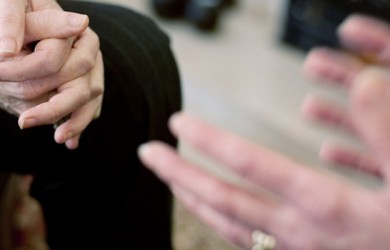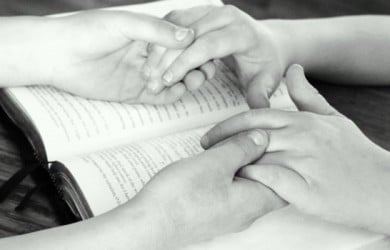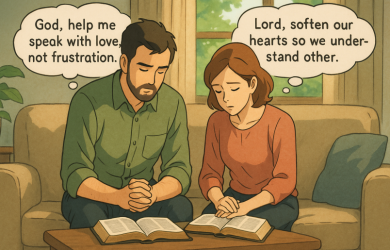Does God Have a Place in the Counseling Process?

Unlock Daily 30-Sec Tips for a Happier Relationship
👉 Subscribe FREEKey Takeaways
Marriage.com AI Quick Summary
When Jessica completed the intake forms in preparation for her first counseling session, her eyes lingered on the last question:
“Are you open to God’s solution? Please circle one- yes, no, unsure at this point.”
She knew she had reached out to a Christian counselor, but she hadn’t thought of her marriage struggles in that light. Because she had gone to church with her family as a child, she considered herself a religious and even spiritual person. So she almost reflexively circled “yes”. She signed the rest of the privacy and financial parts of the paperwork and put them all in her purse so she wouldn’t forget to take them to the session the next day.
That night as she laid in bed with her husband, Matt, she kept thinking about that question-
“Are you open to God’s solution?”
She couldn’t seem to get her mind off it. So much so that she gently nudged Matt, and said, “Honey, are you still awake?” Matt was right on the edge of zoning out for the night, and he groggily answered, “Barely. What’s up?” “You know those forms we filled out for the counselor? What did you put down for the question about being open to God’s solution?” Matt, realizing he didn’t have a choice to avoid this conversation before he could get back to sleep, yawned to help himself wake all the way up. “Um, yeah I think I remember something about that. What about it?” “Well, did you circle, yes, no, or unsure?” “Honey, I circled yes.” Jessica pressed on, “Well, what do you think the counselor means by that?”
While I’m not sure how many clients have those kinds of thoughts about that question on my intake form when they schedule a session with me, I’m imagining some people do. As is the case with any health provider or counselor, I’m looking to gather information about a person’s history, behaviors and worldview that can help me help them. Because clients find me on the web or through a referral identified as a Pastoral Counselor, they no doubt factor their understanding of what that means in their evaluation of me and whether I will be the good fit they are looking for. I am sometimes surprised by the kinds of folks who choose me. They may have a religious background, they may think that a spiritual approach is important, and sometimes, not so much. Recently I received an inquiry from a young adult who had received my bid on her request for counseling services through Thumbtack.
She texted back, “My boyfriend and I aren’t religious. Do you know any non-faith based counseling?” My reply to her was my standard reply to all of my potential clients. “I will meet you where you are. My office is a no judgment zone, and I feel I can help you based on who I am and my passion to help you find hope and healing.”
My worldview is decidedly Christian, and I feel the above approach mirrors the way Jesus accepted people, and I try to emulate that. No judgment, just genuine care. So what does faith based counseling look like, then?
Here are some handles that might help explain my understanding a bit further. Other faith based counselors may be different from me, so your mileage may vary.
It’s solution oriented
My faith worldview is about healing and restoration, which sounds like a solution oriented process to me. I really feel like that’s what clients are searching for, a new way, a new direction. They already know how the current pattern will turn out – again and again. I try to spend the bulk of the time and energy focused not on the past hurts, but on what can we create individually as well as together as a couple to provide a fresh approach to the same issues.
It’s values centric
I feel like many people’s values for their relationship and their marriage line up with my Biblical values, and I can treat my non faith based clients in much the same way as I do my faith based clients without offending them. For instance, some of those shared values are fidelity, trust and “team”. I know there are people in open marriages, triples and quads, but I haven’t met them in my counseling office.
As much as I sense my clients are open to a Biblical worldview, I incorporate those truths into the conversations and ideas for moving forward. It might be suggesting a prayer or specific verse from the Bible that they can read and reread between sessions. It might be sharing or referencing a Biblical account that I feel can shed light on their challenges. Often I pray at the end of a session with those clients who “are open to God’s solution”, and I don’t ask those who reply with a “no” or “unsure”. I just don’t think I’d be a very effective (or ethical!) counselor if I tried to push something on people who aren’t ready, Biblical or otherwise. My Biblical perspective gives me the peace to allow people to move as they are willing, not as I think they should. (I don’t like it when people “should” on me, and I try not to “should” on my clients.)
It’s marriage friendly
In a national survey of over 1,000 marriage and family therapists, over 60 percent indicated that they are “neutral” on marriage vs divorce for their clients. Only one third said: “I am committed to preserving marriage and avoiding divorce whenever possible.” 2.4% even said they frequently recommend divorce. The bottom line: most therapists are neutral when marriages are in trouble. That’s not me. My goal is to transform and heal troubled marriages, because I feel client’s’ future and their family legacies will be richer for it. Often I will say to clients and prospects that I’m siding with them in the decision they made when they said, “I do.”
So, it’s my hope that the Jessicas of this world who walk into my office leave with a sense that they can overcome their hurts and challenges, and be open to how their faith can be a real asset in their healing.
 Tips
Tips
Write your tip or submit a video tip
All tips are reviewed before the publishing.
Share this article on
Want to have a happier, healthier marriage?
If you feel disconnected or frustrated about the state of your marriage but want to avoid separation and/or divorce, the marriage.com course meant for married couples is an excellent resource to help you overcome the most challenging aspects of being married.
Related Articles
Recent Articles
Related Quizzes
Unlock Daily 30-Sec Tips for a Happier, Healthier Relationship
👉 Subscribe FREE on YouTube We'd love your feedback!
We'd love your feedback!
 Expert Q&A
Expert Q&A
Ask your question related to this topic & get the support you deserve from experts.



















 Thanks for your feedback!
Thanks for your feedback!